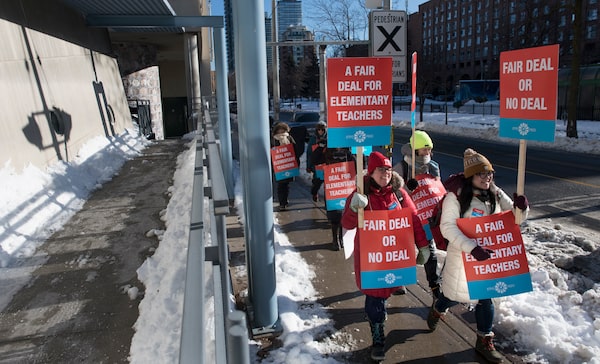
Teachers march outside Market Lane Junior and Senior Public School on Jan. 20, 2020. Elementary school teachers across Toronto are out on strike as well as several other boards.Fred Lum/The Globe and Mail
As elementary school teachers in Toronto, Ottawa and York Region kicked off a week of rotating one-day strikes, Ontario’s education unions say they may be left with little choice but to step up job action if the government does not change its position in contract negotiations.
All the main education unions in the province are involved in some type of job action, from work-to-rule to one-day walkouts, as contract talks stall and tensions with the provincial government escalate.
Sam Hammond, president of the Elementary Teachers’ Federation of Ontario, or ETFO, the province’s largest education union, with 83,000 teachers and education workers, said on Monday that he hoped not to escalate job action, “but we are certainly prepared to do whatever it takes to get the attention of this government and negotiate a deal."
Members in Toronto, York Region and Ottawa hit the picket lines on Monday, shutting down schools. Other boards across the province will be affected by ETFO’s rotating strikes throughout the week, and Mr. Hammond warned that if the government has made no movement by Wednesday, his union would start announcing more job action next week.
The public high-school teachers’ union will continue with its rotating strikes on Tuesday, targeting several boards, including Toronto, on the same day the English Catholic teachers’ union will stage a one-day provincewide strike, the first in more than two decades.
Education Minister Stephen Lecce told reporters on Monday that the government is ready to negotiate when the mediator brings the parties to the table. “We’re also going to continue to make the case that these strikes hurt kids, with the hope that it will cease this escalation, which has had a very, I would argue, adverse impact on learning and on the student experience,” he said.
But Liz Stuart, president of the Ontario English Catholic Teachers’ Association, said teachers are taking a stand against the “government’s regressive cuts.”
“If the province doesn’t come back to the bargaining table with a change in their mandate, then we’ll have to make decisions what our next steps are going to be, and it may very well include stepping up some of our strike action," Ms. Stuart said. “We’re going to be hopeful we don’t need to do that.”
Several issues are at play, including class-size increases, mandatory online courses for high-school students, a wage cap and other cost-saving measures.
Ms. Stuart said her team had become increasingly frustrated because the government negotiators wanted only to find permanent savings, not to discuss how to support students. “We believe that the way you bargain is through discussion and dialogue. That’s how you get the best deals you can. This government appears to feel it needs to do it through legislation and regulation, and that’s not helpful,” she said.
The only union with bargaining dates scheduled is the Association des enseignantes et des enseignants franco-ontariens, which represents staff in the province’s French-language boards.
Mr. Lecce announced last week that parents can apply for as much as $60 a day in compensation for each child if strikes shut down their elementary school or school-based daycare. Alexandra Adamo, a spokeswoman for Mr. Lecce, said that as of Monday afternoon, the government had received 139,749 applications.
Mr. Lecce maintained that the main stumbling block in negotiations has been wages, with the unions asking for a 2-per-cent increase in the face of the government’s wage-cap legislation, which is meant to limit public-sector pay increases to 1 per cent.
Union leaders, who are challenging the legislation, say their members are simply asking for cost-of-living increases in line with inflation.
Harvey Bischof, president of the Ontario Secondary School Teachers’ Federation, said his union has been “thoughtful and measured” in its approach to strikes, not wanting to cause too much disruption to students and families, while also raising attention to the cuts the government has proposed. He said that Tuesday’s walkout would be the last until after high-school exams.
Mr. Bischof said he believed teachers and education workers have made the public aware of the issues, many of whom support them. “I can’t speak about what’s happening in backrooms of government. We’ve certainly have no indication that they are getting off their destructive path,” he said.
 Caroline Alphonso
Caroline Alphonso Jeff Gray
Jeff Gray